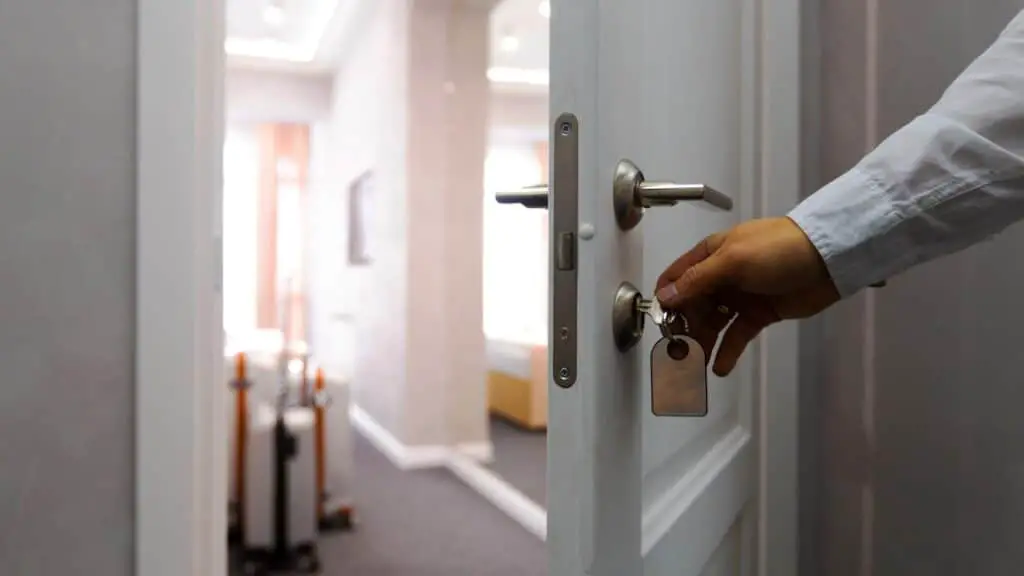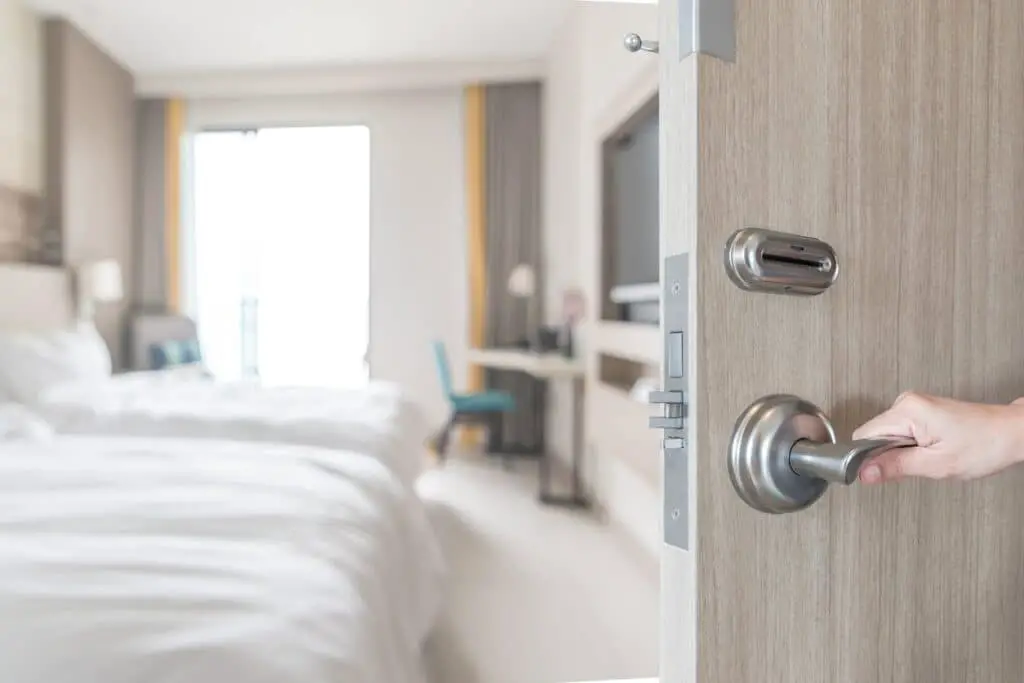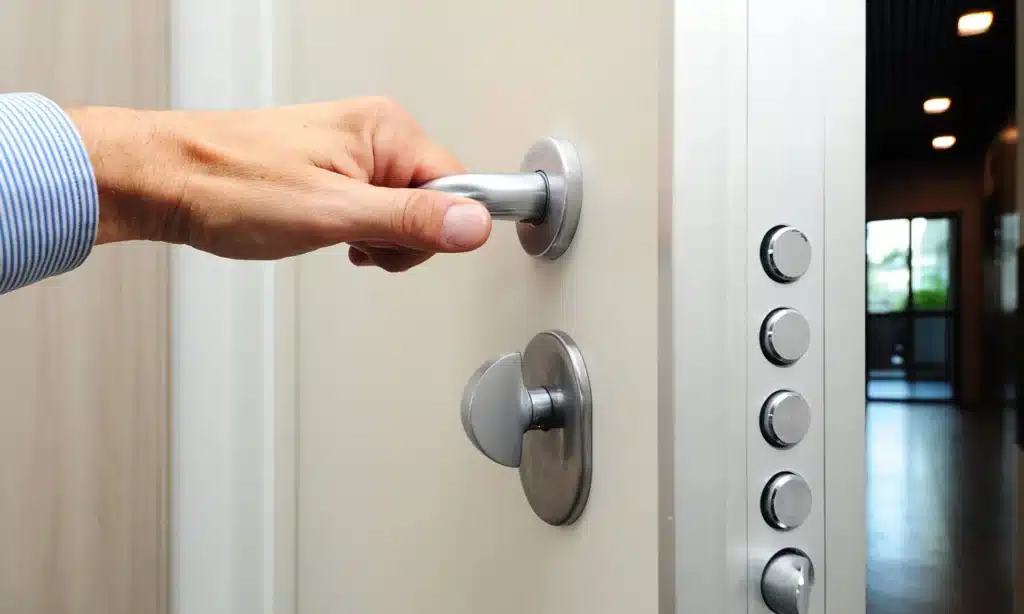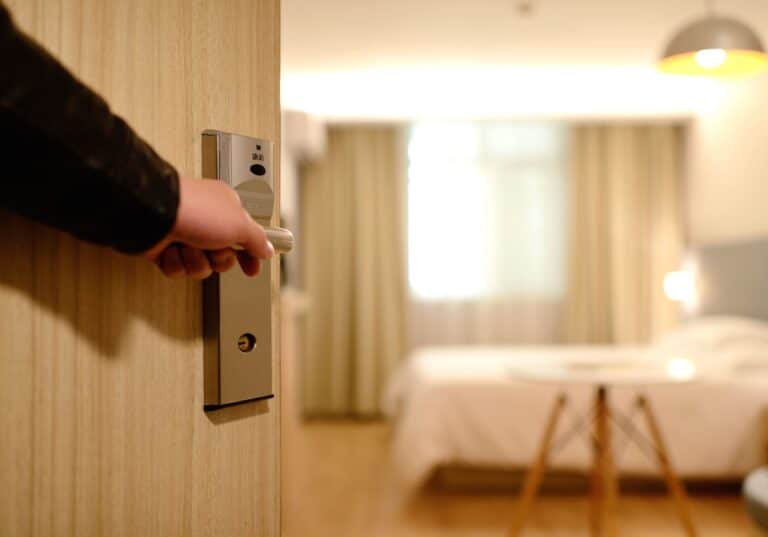Introduction
When staying in a hotel, ensuring the safety and security of your personal belongings and yourself is of paramount importance. One crucial aspect of hotel security is securing your hotel room door. Hotel room doors can be vulnerable to unauthorized access, and taking steps to enhance their security camera can provide peace of mind during your stay. By implementing a few simple yet effective measures, you can significantly reduce the risk of unauthorized entry and safeguard your belongings.
Both physical security measures and behavioral practices that can enhance the overall safety of your accommodations. These strategies are designed to provide an added layer of protection and minimize the potential for theft, intrusion, or any other unauthorized access.
Whether you are a frequent traveler or a first-time hotel guest, understanding how to secure your hotel room door can help create a sense of security and contribute to a worry-free stay. By following the recommendations and tips, you can take proactive measures to enhance the safety and protection of your hotel room, ensuring a more enjoyable and stress-free travel experience.

How to barricade a hotel room door?
The simplest way to add extra security to your hotel room is with a rubber door wedge, and many travelers swear by them. They’re cheap, take up almost no space in your bag, and can be set up in just a few seconds. You simply place the thin end under the door jam; then gently kick the wedge into place to secure it.
Barricading a hotel room door may provide security and protection. Hotels usually have security safeguards, but taking additional steps might offer you piece of mind. Steps to block a hotel room door:
Check the door and frame before commencing. Which barrier you use depends on whether it swings inward or outward.
Serve the furniture: Find solid, moveable furniture to serve as a barrier. Heavy things like chairs, tables, or the mattress may be put against the door to make opening it harder. Use a door wedge or doorstop to keep inward swinging doors from opening. Secure the wedge at the door base inside.
Travel-specific door security devices: Consider buying one. These door reinforcement devices may be packed in baggage and provide security. Door jammers, portable locks, and braces are examples.
Communication with hotel employees: Tell the hotel staff about your worries and ask for room relocation or a security escort.
How do you secure a hotel door with a towel?
Terence (@terenceharrisqts) ties the towel around a clip at the top of the door, which is also supposed to prevent others from entering your room, before securing it tightly with the scrunchie.
Securing a hotel door with a towel can provide a temporary solution in situations where you may not have access to more advanced security devices. While it is not the most robust method, it can serve as an additional deterrent. Here are the steps to secure a hotel door with a towel:
Assess the door: Determine whether the door swings inward or outward. This will help you determine the most effective way to use a towel for added security.
Roll up the towel: Start by rolling up the towel tightly. Ideally, use a thick and absorbent towel for better effectiveness.
Wedge the towel under the door: If the door swings inward, open the door slightly and slide the rolled-up towel under the gap between the door and the floor. Make sure the towel is placed horizontally, spanning the width of the door.
Apply pressure: Once the towel is in position, close the door and apply pressure to compress the towel against the floor. This will create friction and resistance, making it more difficult for the door to open.
Test the door: Push against the door to check if the towel is securely wedged and provides resistance. Adjust the towel if necessary to ensure a snug fit.
Should I lock my hotel room door?
It is also important to keep your hotel room door locked at all times, even when you are in the room. Don’t assume that just because you are inside, you are safe from potential intruders. By using these additional safety measures, you can help ensure a safe and secure stay in your hotel room.
For several reasons, you should secure your hotel room. Keeping your hotel room locked protects your safety, privacy, and things. Key reasons to lock your hotel room door:
Personal safety Locking your hotel room door prevents invasions, theft, and damage. It provides physical deterrence and peace of mind whether sleeping, relaxing, or leaving the room.
Hotel room locks provide privacy. It stops hotel personnel and customers from breaking in. You can manage who enters your room and when.
Keep your stuff secure by locking your hotel room. Even if you trust the hotel employees, closing the door protects your valuables, passports, devices, and cash.
During your stay, locking your hotel room door gives you peace of mind and security. It lets you sleep, work, and relax without worrying about your room or safety.
For maximum security, utilize all door locks, including deadbolts, chain locks, and security latches. When leaving your room, even briefly, double-check that the door is locked.
What is used to secure hotel room and avoid theft?
There are two main types of hotel safes you’ll come across; the hotel in-room safes and the hotel safes behind or near the front desk. The in-room safes, while more convenient, are the less secure of the two and they usually have less liability protection too, so it’s better to use the ones at the front desk.
Hotel rooms are secured using numerous methods to prevent theft. These precautions protect visitors and their valuables. Here are some typical hotel room security tactics to prevent theft:
Electronic locks Most hotels utilize key card systems for secure room access. The key card is required to open these locks, making illegal entrance impossible.
In-room safes or safety deposit boxes are common in hotels. These safes can protect passports, cash, jewels, and gadgets against theft.
Hotel surveillance systems include CCTV cameras strategically placed across the facility. These cameras monitor public places, corridors, and entrances to discourage criminals and provide proof.
Security Many hotels have security guards who watch guests. These specialists are trained to spot suspicious activity, handle crises, and keep visitors secure.
Hotel room doors include deadbolts and chain locks for further protection. To enhance room security, guests might request door jammers or portable door locks.
Guest identification and registration Hotels ask guests to provide identity and register. This ensures only approved guests may enter the hotel.
What are hotel room locks called?
The RFID locks are widely used in hotels because the code cards can be reprogrammed for each guest. These are the advantages and disadvantages of RFID system: Advantages. Disadvantages.
Hotel room locks are commonly referred to as electronic locks or key card locks. These locks have become the standard in the hospitality industry due to their convenience, security, and ease of use. Here are some key features and types of hotel room locks:
Key card locks use plastic key cards with electrical chips. The key card connects with the lock’s system to authenticate the guest’s access rights and permit entrance when inserted or near a sensor. Key cards are simply disabled and reprogrammable.
Magnetic stripe locks utilise a magnetic stripe on the back of the key card. Lock’s magnetic reader reads encrypted information on the magnetic stripe, giving access.
RFID locks connect between key cards and locks using radio frequency technology. The key card’s microchip sends a radio signal that the lock reads to authenticate and permit entry.
Some hotels now have smart locks that can be operated by smartphones or other mobile devices. Bluetooth or Wi-Fi locks let customers open and lock their rooms using their phones.

How can I check the security features of my hotel room door?
Checking the security features of your hotel room door is an important step to ensure your safety and peace of mind during your stay. Here are some ways you can assess the security features of your hotel room door:
Examine the lock mechanism: Take a close look at the lock on your hotel room door. Is it a sturdy deadbolt lock or a basic latch? Deadbolt locks are more secure as they provide a stronger barrier against forced entry.
Test the door’s strength: Gently push against the door to see if it feels solid and well-built. A sturdy door made of solid materials will offer better resistance against tampering or forced entry.
Check for a peephole: Look for a peephole on the door. A peephole allows you to see who is outside your door before opening it, enhancing your safety and privacy.
Inspect the door frame: Assess the condition and quality of the door frame. A well-maintained and properly installed door frame can enhance the overall security of the door.
Look for additional security devices: Check if there are any additional security features installed on or around the door, such as chain locks, secondary deadbolts, or security latches. These can provide an extra layer of security.
Should I use the deadbolt lock provided in my hotel room?
Deadbolt locks offer an additional layer of security and can significantly enhance your safety and peace of mind during your stay. Here are a few reasons why you should use the deadbolt lock:
Increased security: Deadbolt locks are designed to provide enhanced security compared to regular latch locks. They have a thicker bolt that extends deeper into the door frame, making it more difficult for someone to force open the door.
Deterrent against unauthorized entry: Using the deadbolt lock signals that the room is occupied and adds an extra level of deterrence against potential intruders. It can discourage unauthorized access and provide you with a sense of security.
Privacy: The deadbolt lock ensures your privacy by preventing anyone with a key card or master key from entering your room without your consent. It gives you control over who can access your room and when.
Peace of mind: Engaging the deadbolt lock can give you peace of mind, allowing you to relax, sleep, or leave your room without constantly worrying about security. It adds an extra measure of protection, especially when you are inside the room.
Personal safety: The deadbolt lock provides an effective barrier against forced entry, increasing the time it takes for an intruder to gain access. This can give you valuable seconds or minutes to react, call for help, or find a safe hiding place in case of an emergency.
Can I use additional security devices for my hotel room door?
In many cases, you can use additional security devices for your hotel room door to enhance your personal safety and peace of mind. While hotels generally have their own security measures in place, adding extra layers of protection can provide you with an added sense of security. Here are a few points to consider regarding the use of additional security devices for your hotel room door:
Portable door locks: Portable door locks are compact devices that can be easily carried in your luggage. They provide an extra level of security by adding a secondary lock to the door. Examples include door jammers or portable door locks that attach to the door frame, making it more difficult for someone to force their way into the room.
Door wedge or doorstop: A door wedge or doorstop can be used to prevent the door from opening. Simply place the wedge at the base of the door on the inside, creating a physical barrier that makes it harder to open the door.
Door braces: Door braces are adjustable bars that can be placed horizontally across the inside of the door. They provide added strength and resistance, making it challenging for someone to kick or force the door open.
Consult hotel policies: Before using any additional security devices, to review the hotel’s policies regarding such devices. Some hotels may have specific rules or restrictions on the use of certain security devices for safety or liability reasons. Contact the hotel staff to inquire about their policies and seek permission if necessary.

Conclusion
Securing your hotel room door is an essential aspect of ensuring personal safety and protecting your belongings while staying in a hotel. By implementing the strategies and precautions discussed you can significantly enhance the security of your accommodations and reduce the risk of unauthorized entry. These measures act as deterrents and make it more challenging for unauthorized individuals to gain access.
Simple actions like not disclosing your room number to strangers, keeping your room key secure, and using the peephole before opening the door can go a long way in preventing potential threats. It is crucial to that while hotels strive to provide a safe environment for their guests, individual responsibility plays a significant role in maintaining personal security. By taking proactive steps to secure your hotel room door, you can contribute to your overall safety and peace of mind.
By prioritizing your safety and implementing the measures discussed, you can minimize the risks associated with hotel stays and enjoy a secure and worry-free experience. Securing your hotel room door is a small investment that can have a significant impact on your overall safety and comfort during your travels.

